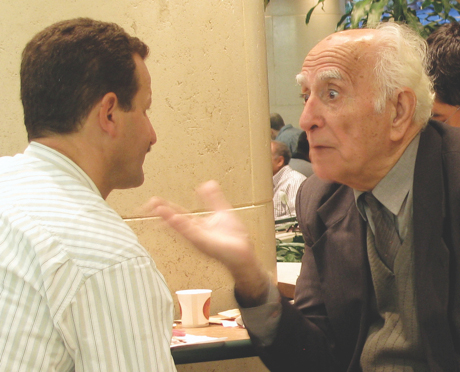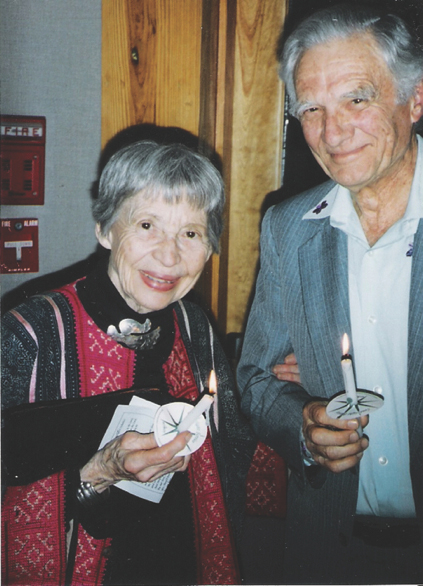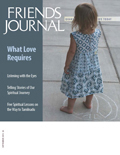
Courtney Siceloff was one of the first people to greet me when I started attending Atlanta (Ga.) Meeting. He was then clerk of the Southeast Regional Executive Committee of American Friends Service Committee so when he learned of my summer internship with AFSC, we began exchanging stories about our AFSC experiences. We discovered that we both attended our first Quaker meeting as young adults while participating in service projects. Our early conversations led Courtney to invite me to be nominated to the AFSC committee. He and his wife, Elizabeth, soon became close friends through our work for Atlanta Meeting and AFSC, and over many dinners I gradually learned more about the love and Light of these two Friends.
After knowing him for more than 25 years, I heard Courtney tell the story of his spiritual journey when he gave the evening plenary address at Southern Appalachian Yearly Meeting’s annual sessions. I was amazed by how much I learned about his life and felt even more deeply connected to him because I now understood how leadings of the Spirit shaped him and led him to Quakers.

Born the son of a Methodist minister, his family moved every three or four years between small towns in northern Texas, and so he learned to make friends wherever he was. As a college student, Courtney spent summers picking cotton beside older African American workers and began to learn more about their lives. At Southwestern University in the early 1940s, he became involved in discussions with a Methodist student movement exploring issues of racism and pacifism and joined a peace caravan led by A.J. Muste and Bayard Rustin. After graduating in 1943, when most of the young men he knew volunteered for World War II, Courtney chose to be a conscientious objector. He worked in U.S. forestry camps and in 1946 volunteered for the United Nations relief effort to send cattle to Europe.
As I listened to his story, it became clear how his early life had led him to his first meeting through Quaker conscientious objectors, then on to work for the AFSC in Europe, the Penn Center in South Carolina, the Peace Corps in Afghanistan, and the U.S. Civil Rights Commission. His story was an extraordinary example of the Quaker saying: “Live up to the light thou hast, and more will be granted thee.”
This yearly meeting session inspired me to create an opportunity for Friends at our monthly meeting in Atlanta to share their stories of leadings with the community. I wanted to hear more of the life experiences, the beliefs, and the core truths that make us Friends. Atlanta Meeting has many older Friends like Courtney, who was then 75, and we risked losing their stories.
The “Stories of the Elders” project was born. I began recruiting our oldest Friends to share their spiritual journeys with the adult religious education class. We offered each guest the full 50 minutes of class time to tell his or her story and used the following list of questions I developed as guidelines for discussion:
- What were your early experiences with religion and lessons about God?
- How did that concept of God/religion change and grow as you began to understand these early lessons?
- What special life turning points brought you closer to or away from God?
- What influence did education, career, marriage, children have on your faith and practice?
- How did you learn about Friends? What led you to this meeting?
- How has this meeting supported your spiritual journey?
- What do you believe now?
Since this project began in 2007, we’ve heard and recorded the story of one Friend each month. Now we have a library of more than 50 stories that includes the voices of our “elder” Friends and some younger ones, too.
Atlanta Meeting has only a few lifelong Friends. Many of our members are religious refugees who were frightened by sermons of sin, hellfire, and damnation; they gave up on religion as soon as they could. Others found out about Quakers through organizations like AFSC, Friends schools and colleges, the Pendle Hill conference center, or through the social action witness of Friends. Not many of us ever received a personal invitation from a Friend.
Many Friends have early experiences with religion, which help give insight into how a spiritual journey unfolds. When I told my story, I recalled one Sunday when I was nine years old sitting in a Baptist worship service. I wasn’t paying much attention to the sermon, so when I heard Reverend Starnes say, “then we shall see God,” I got excited by the idea, expecting a man like the picture of Jesus in the Sunday School lesson to come walking through the doors. When nothing happened, I became very curious about seeing God and later asked my father when and where I had to go to see God or Jesus. He told me that I could see God in all of creation and in everyone. This was not the concrete answer I wanted, but I later realized that it was a turning point that led me to still more questions and eventually to Friends.
I continue to learn from the stories of Friends that I know well. My husband, Bill, grew up on a variety of Air Force bases as the son of a chaplain. He enjoyed his father’s sermons and their message that “God is love.” He became convinced that all killing is wrong, and in high school decided to go to prison rather than fight in the Vietnam War. His father advised him to read about George Fox and Quakers, and also to register as a conscientious objector. He decided he was a Quaker even before he ever attended a meeting.
I’ve also heard about powerful turning points. Life traumas, grief, and loss turn some to religion and others away. One Friend told us of being beaten and raped so severely that it caused a near-death experience, during which she saw family and friends holding her in love. This vision of love later became a source of healing and faith. My father died of a heart attack when I was a 17-year-old high school senior. Even though I blamed God, I had been taught to pray and so I prayed, if only to make it clear I blamed Him. I struggled to create a new relationship with God and questioned everything I had been taught, but the experience was a fire that forged my faith. I hear a similar thread in many stories.
Some Friends have been reluctant to speak. I know from telling my story how hard it can be to openly share your personal viewpoint on religion. Out of all my life events, how do I identify the key turning points? What has shaped me? What do I believe now? If I define the word “spiritual” as my relationship with God, with who or what I believe God is, then what supports or hinders this relationship?
In early November 2011, our meeting found another way of sharing beliefs during a day-long Quaker Quest workshop led by visitors from Friends General Conference. Those in meeting had opportunities to speak and hear from others on a variety of topics; for example, two Friends shared about personal experience with the testimony of simplicity. What touched me most was hearing Friends put their beliefs into words, confessing any struggles to articulate our faith.
We have also experimented with a “Quakerism 101” class in which Friends are encouraged to speak about an experience with one of the testimonies. This basic class proved to be a good way introduce newcomers to our beliefs and practice, while allowing all participants to learn more about one another.
I’ve noticed that there is wide interpretation of the word “spiritual” when Friends share about spiritual journeys. One Friend focused her story on her faith rather than on her work, leaving out the leading she followed to start a shelter for battered women and another for the homeless and mentally ill. I later suggested that her work is her faith made visible, and she agreed to do a second talk about the work itself.
These stories help us discover how we translate faith into practice and how this translation develops over time. Recording Friends who speak allows us to build an archive that can be shared among us and with other seekers. Perhaps the greatest benefit is that the more we know about each other and our lives, the deeper and more meaningful our meeting for worship becomes. Sharing our spiritual stories is one of the most important ways we have to build our beloved community, to continue our own holy experiment.



Comments on Friendsjournal.org may be used in the Forum of the print magazine and may be edited for length and clarity.